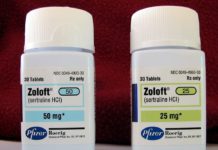“Whitewashing a Black Box Warning: The Chantix Story That Didn’t get Told”
"The decision to remove the Chantix black box warning had its roots in a study known as the EAGLES trial, which was mandated by...
Olanzapine Can Cause Serious Skin Reaction, FDA Warns
The US FDA has issued a new warning for the atypical antipsychotic Olanzapine, also known by the brand names Zyprexa and Symbyax. The agency...
Study Links SSRIs to Violent Crime in Youth
Individuals between the ages of 15 and 24 are more likely to commit a violent crime if they are taking an SSRI antidepressant than if they are not, according to new research out of Sweden. The study published in PLoS Medicine on Tuesday, suggests "warnings about the increased risk of violent behavior among young people taking SSRIs might be needed.”
“Public Wary of Faster Approvals of New Drugs, STAT-Harvard Poll Finds”
According to a new STAT-Harvard poll, the majority of Americans oppose new legislation that would speed up the approval of new drugs and medical...
“Personal Pain led Widow to Prescription Drug Safety Advocacy”
“In 2003, Kim’s husband, Tim ("Woody") Witczak, sought help for insomnia. His doctor prescribed the antidepressant Zoloft. Five weeks later, Witczak's father found Woody...
Children Diagnosed with ADHD Younger are More Likely to get Multiple Medications
New research demonstrates that children diagnosed with ADHD at younger ages are more likely than those diagnosed later to receive multiple medications within five years of their diagnosis.
Editorial Takes On Conflicts of Interest and Propaganda in Psychiatry
In a scathing editorial in this month’s Psychotherapy and Psychosomatics, Dr. Giovanni Fava takes aim at prominent medical experts who have downplayed the role...
“Psychiatric Drugs Are Being Prescribed to Infants”
The New York Times reports that a growing number of infants and toddlers are being prescribed dangerous psychiatric drugs. “Almost 20,000 prescriptions for risperidone (commonly known as Risperdal), quetiapine (Seroquel) and other antipsychotic medications were written in 2014 for children 2 and younger, a 50 percent jump from 13,000 just one year before.”
“Antipsychotics May Be Pushed On Those with Intellectual Disabilities”
Psych Central covers findings published in BMJ revealing that many people in the U.K. with intellectual disabilities are being prescribed antipsychotic drugs. The study’s lead author comments: “People who show problem behaviors, along with older people with intellectual disability or those with co-existing autism or dementia, are significantly more likely to be given an antipsychotic drug, despite this being against clinical guidelines and risking possible harm.”
Forced Psychiatry – A Legal Perspective
In this two-part video series for AdvancingMentalHealth.org, attorney Gary Brown questions the constitutionality of psychiatric confinement and discusses forced treatment from a legal perspective.
Part I →
Part II →
STOP or GO? Tapering Pregnant Women off of Antidepressants
A team in the Netherlands is currently investigating the effects of tapering off of antidepressants known as selective serotonin reuptake inhibitors (SSRIs) during pregnancy....
“Drug Overdoses Propel Rise in Mortality Rates of Young Whites”
“The rising death rates for those young white adults, ages 25 to 34, make them the first generation since the Vietnam War years of the mid-1960s to experience higher death rates in early adulthood than the generation that preceded it,” the ‘Times reports.
Autism’s Drug Problem
From Scientific American: Many autistic children are prescribed multiple psychiatric medications, which can lead to serious adverse effects and are often ineffective.
"Multiple diagnoses lead to...
The Promise of LSD Microdoses and Other Psychedelics
In this interview for Scientific American, psychiatrist John Halpern discusses some of the potentially therapeutic effects of peyote, ayahuasca, psilocybin, MDMA and other psychedelics.
"Once when...
“More on the Clinical Trial Disaster in France”
Just last week one person was declared brain dead and five more were hospitalized after taking a psychiatric drug in a clinical trial. Writing for Science, Martin Enserink provides more information about the drug as new details emerge.
The Most Promoted Drugs are Those with Little Therapeutic Value, Study Finds
Majority of top-selling and most promoted drugs in Canada are rated as having very limited safety and efficacy.
Study Explores Pain Assessment for Medically Complex, Nonverbal Children
To what extent are healthcare providers equipped to assess nuance in the experiences of pain among nonverbal children?
Researchers Challenge Interpretation of Antidepressant Meta-analysis
Researchers question the overstated results of a large antidepressant meta-analysis and point to cultural pressures to turn to these drugs for a quick fix.
Donald Trump’s Drug Czar is Very High on Forced Rehab
From Vice: Donald Trump's expected nominee for director of the Office of National Drug Control Policy, Congressman Tom Marino, is a proponent of mandatory inpatient...
Mental Health Awareness Month: Seven Things to be Aware of
In this piece for Truthout, Noel Hunter lists seven facts it is important to be cognizant of during Mental Health Awareness Month, from the influence...
Dear Scott Gottlieb: Add New Warnings to Paxil Labels
From STAT: Scott Gottlieb, Trump's pick to lead the FDA, should consider pursuing a stronger warning label for the antidepressant Paxil. Paxil's label currently does...
The FDA Is Hiding Reports Linking Psych Drugs to Homicides
In my wildest dreams, I could never have imagined being drawn into a story of intrigue involving my own government’s efforts to hide, from the public, reports of psychiatric drugs associated with cases of murder, including homicides committed by youth on the drugs. But that is precisely the intrigue I now find myself enmeshed in.
Less Than Half of Clinical Trials Comply with Legislation to Accurately Report Results
A new study finds that sponsors of clinical trials in the EU continue to fail at reporting their results as required by recent legislation.
Trump’s Pick for Mental Health ‘Czar’ Highlights Rift
From The New York Times: President Trump's nominee to direct SAMHSA, Dr. Elinore McCance-Katz, who is a strong proponent of the medical model of psychiatry,...
Drug May Lead to Early Death for People With Alzheimer’s
From The Washington Post: A recent study found that benzodiazepines are associated with a greater chance of early death for those with Alzheimer's.
"Researchers analyzed data on...
























